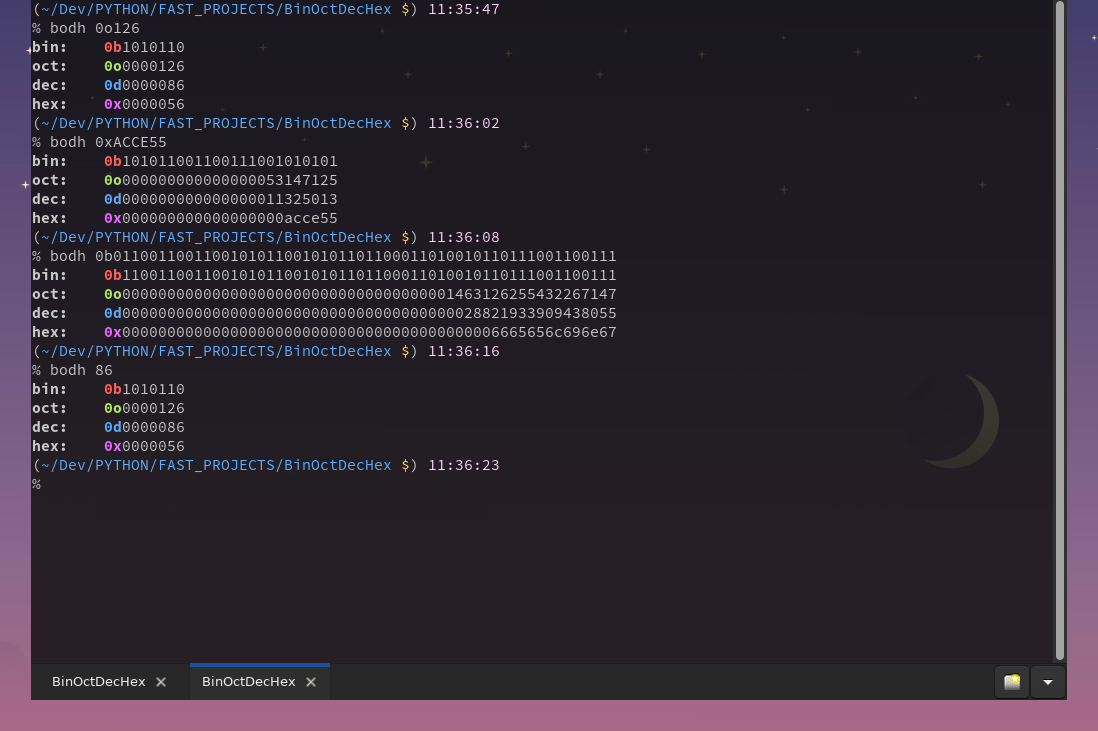bodh stands for Binary Octal Decimal Hexadecimal...
It is very simple to use: invoke the command with any integer as its (only) argument(*), and it displays it in the 4 formats aforementioned.
(*) If the number is not decimal write it with the proper prefix convention that bodh follows: 0b for binary, 0o for octal, 0x for hexadecimal).
Incise (for beginners! skip it otherwise)
To use it, simply download and extract, or clone, this repo:
git clone git@github.com:idealtitude/bodh.git
cd bodhCheck that bodh.py has the adequate permissions to be executed. Then, you can also copy/move/link it in your ~/bin or ~/.local/bin directory (1):
mkdir -p ~/bin
cp /path/to/bodh.py ~/bin/bodh
chmod 755 ~/bin/bodh
source ~/.bashrc # see note #1 belowExample
Do bodh 547 (or ./bodh.py 547 from bodh folder), and it will output the following:
bin: 0b1000100011
oct: 0o0000001043
dec: 0d0000000547
hex: 0x0000000223
Or bodh 0x223, bodh 0b1000100011, bodh 0o1043 (same output for the three of them because it's the same number, 547).
Other than that, bodh is internally uselessly convoluted and I should rewrite it from scratch in a clean, efficient, and pythonic way (this third adjective is indeed a pleonasm in view of the infamous pep 8 (2)). Nevertheless it's pretty fast on my machine:
time bodh 0xffffffffffffffff
bin: 0b1111111111111111111111111111111111111111111111111111111111111111
oct: 0o0000000000000000000000000000000000000000001777777777777777777777
dec: 0d0000000000000000000000000000000000000000000018446744073709551615
hex: 0x000000000000000000000000000000000000000000000000ffffffffffffffff
real 0m0,069s
user 0m0,054s
sys 0m0,012sI had fun to write it, even if I almost got lost from time to time while doing it (I didn't plan it enough beforehand); if you find it useful and enjoyable, it will be an additional gratification for me!
N.B.
Incidentally, “bodh” in Bengali means "feeling" (3).
Incise: For my projects I often try to use a name of which the acronym can be a word in other languages.
- add support for signed numbers
- add support for float numbers (*)
- add suppurt for complex numbers
- add support for base 60 conversion
(*) Relevant link: S.O. Discussion
(1) How to create a bin directory in your $HOME directory and add it to your $PATH:
1.1
nano ~/.bashrc1.2
Write the following in your .bashrc:
if ! [[ "$PATH" =~ "$HOME/.local/bin:$HOME/bin:" ]]
then
PATH="$HOME/.local/bin:$HOME/bin:$PATH"
fi
export PATH1.3
Save the content (ctrl+s or ctrl+o) and exit nano (ctrtl+x); then do source ~/.bashrc, and that's it, you can now invoke bodh from your terminal (type bodh -h or bodh --help to see the help message).
(2) ”Style Guide for Python Code”
(3) spelling of “bodh”: বোধ
